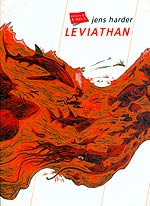
|
Jens Harder's "Leviathan" (NBM/Comics Lit; 144pp) has an international flavor. Created by a German artist and released on both sides of the Atlantic, it has been written in the boundless language of wordless comix, except for the chapter headings that appear in four different languages. It features the creature of the title, a giant sperm whale, as it swims through disparate oceans, encountering man and beast through the ages. Foregoing a traditional story, it reads like Neptune's dream after a night of bad sushi. Harder depicts the whale as a fearsome monster, a silent behemoth that rules the seas. He battles a giant squid, dinosaurs, The Pequod from Herman Melville's "Moby Dick," the Titanic and even Noah's ark. It is not about a real whale, but the idea of a whale.
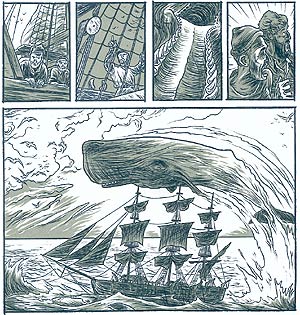 The giant whale on a rampage in "Leviathan"
The giant whale on a rampage in "Leviathan" |
Drawing "Leviathan" with a palate of pale green, black and white, Harder loves to see things rendered, in both senses of the word. Beautifully designed sequences show tentacles flying, wood splintering and people flailing desperately in the churning sea. Between the scenes of oceanic chaos come surprising and strange tableaus, as when the whale somehow transgresses the bounds of the earth and floats in outer space. You don't read "Leviathan" so much as give in to its visceral sensation. Harder depicts the angry cetacean as, among other things, a metaphor for our fears of nature. But, while quite fascinating to look at, I have to draw the line at the wildly steep cover price. There's simply no justifying $35 (25 euros!) for a cardstock cover and two tones of color.
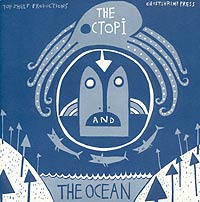
|
Oddly reminiscent of "Leviathan," both Dan James' "The Octopi and the Ocean," (Top Shelf Productions; 52pp.; $6.95) and Peter Kielland's "Fish" (Kim-Rehr Productions; 72pp.; $8.95) use pantomime and free-associative storylines, but to much sillier ends. "The Octopi" imagines the brainy encepholopods as being at constant war with the brawny sharks. In order to retrieve an important talisman from the sharks, the octopi kidnap a boy by substituting his school bus with an amphibious vehicle driven by a disguised octopus. After bringing back the talisman the boy gets folded into the shape of an envelope and returned via post to his parents. It goes on, but you get the idea. The nonsensical story exists only as a reason to make pictures. Printed with deep-blue ink, James' unconventional style evokes expressionist woodcuts. However, the lack of any real point in "The Octopi" ultimately detracts from its vaguely amusing pleasures.
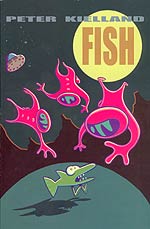
|
Peter Kielland's "Fish" combines the absurdity of "The Octopi" with the sweep of "Leviathan." The title character, a fish with feet, wanders through the ages, mostly in terror and under pursuit. He begins at the dawn of man and witnesses the arrival of aliens who zap the dumb apes with higher consciousness. Uninterested in such goings on he goes to sleep and somehow wakes up in the early twenty-first century. Soon he goes from barroom oddity to household pet to valuable commodity. Escaping it all, he falls asleep and wakes up during the apocalypse where he soon becomes a meal for a mutant. It's sort of cute, but its arbitrary storyline robs it of the chance to become any sort of allegory. Since it has been written without words you finish the story in less than ten minutes and forget it in less then two.
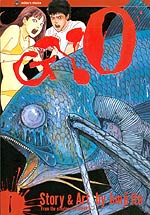
|
One fish story you will never forget, try as you might, is Junji Ito's "Gyo" (Viz; 200 pp.; $12.95). Ito specializes in horror comix, a genre virtually wiped out in America since EC comics had to stop publishing "Tales from the Crypt" and its sister titles in the early 1950s. Ito's chilling stories have some of the oddest premises in the genre. "Uzumaki," published in the U.S. by Viz in 2002, featured a town visited by a plague of spirals. "Gyo" starts out with Tadashi and his girlfriend Kaori on vacation at the coastal city of Okinawa. She's sensitive to smells and becomes overwhelmed by a powerful stench. Tadashi soon locates the source: a rotting fish with mechanical, insectoid legs that has crawled out of the sea and found its way into their bungalow.
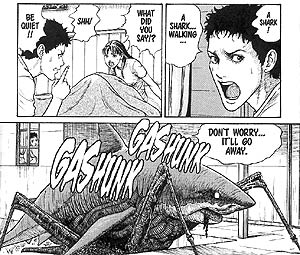 Tadashi and Kaori better stay in their room in "Gyo"
Tadashi and Kaori better stay in their room in "Gyo" |
Over the coming days more of these weird, dead-yet-alive fish come rushing out of the ocean, overwhelming the city. Killer sharks roam the streets. Back home in Tokyo Tadashi's scientist uncle recalls hearing of a military experiment that went down at sea — a mutated germ that turned living creatures into noxious gasbags. These were attached to mechanical legs powered by the gas, and the two halves formed a symbiotic relationship. Soon the creatures find their way to Tokyo in search of new hosts, including Kaori, now infected by the germ. Her body slowly becomes a paralyzed, pustulated, corpulent emitter of foul gas. Humans have become latest alternative fuel.
"Gyo" should not be missed by anyone with the stomach for top-quality horror. Like all the best of its genre, "Gyo" gets at larger ideas, like humans becoming slaves to their machines, while also supplying plenty of outrageous gore and freaky jolts. Fans of the films of David Cronenberg, such as "The Fly" and "Rabid," with their themes of bodily corruption, will see his influence on Ito's work. His brilliant drawings only become more outrageous as the story goes on, searing your brain with fantastically detailed moments of gut-puking carnage and nightmarish surreality. At one point Tadashi encounters a circus taken over by the germ that keeps going about its business — a seeping, rotting parody of its once jubilant self. One complaint: although the entire book is in English, including the sound effects, it has been printed right to left; a pointless gimmick that adds nothing to the book except frustration. In spite of this, Junji Ito's "Gyo" should be your top choice for beachside reading this weekend. Just make sure to read it before lunch.
